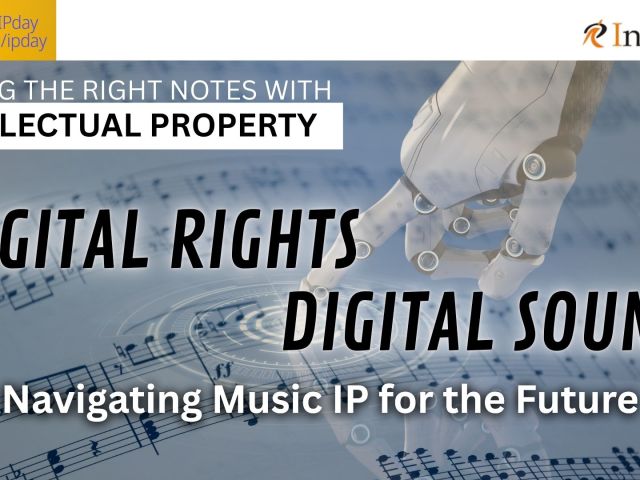World IP Day serves as a globally significant occasion to celebrate the power of intellectual property in fostering innovation and creativity across diverse industries. This year’s theme, “IP and Music: Feel the Beat of IP,” provides a focused lens on the profound and dynamic relationship between IP and the music industry, highlighting how IP rights are essential to protect the creative and economic vitality of this vibrant sector.
As our firm, Intepat IP, concludes its “Hitting the Right Notes with Intellectual Property” campaign, we aim to synthesize the key insights gained and emphasize the strategic importance of IP in shaping the industry’s future. Our campaign has consistently underscored that IP rights are not merely legal formalities but fundamental instruments that incentivize creativity, protect innovation, and drive economic growth across the musical landscape, benefiting creators, businesses, and consumers alike.
Copyright law serves as the bedrock of Music IP, safeguarding the original artistic expressions embodied in musical compositions and sound recordings. Copyright grants exclusive rights to creators, empowering them to control the reproduction, distribution, performance, and adaptation of their musical works. This protection extends to both the underlying musical composition (the notes and lyrics) and the sound recording (the fixation of a performance). These rights are essential mechanisms for fostering a vibrant musical ecosystem that appropriately rewards artistic expression, enables creators to sustain their livelihoods, and encourages the continued production of original and diverse music.
While copyright protects the artistic elements within music, patent law plays a crucial role in safeguarding the technological innovations that drive the industry’s evolution. Patents protect novel inventions, encompassing a wide spectrum from pioneering musical instruments to groundbreaking audio effects and sophisticated recording technologies.
- Utility patents safeguard the functional aspects of these inventions, such as the unique mechanics of novel instruments (e.g., improved string mechanisms, innovative soundboards), or the innovative algorithms underpinning audio processing software (e.g., new reverb algorithms, advanced noise reduction techniques).
- Design patents protect the ornamental appearance of musical instruments and equipment, focusing on their aesthetic features (e.g., the distinctive shape of a guitar body, the unique visual design of a mixing console).
Patents function as powerful incentives for research and development, promote technological advancement, and ultimately enable the creation of entirely new sonic landscapes and musical experiences, fundamentally reshaping the way music is created, performed, and consumed. This protection encourages investment in innovation, knowing that the resulting technology can be exclusively exploited for a period of time.
In addition to copyright and patents, trademarks are a crucial element of Music IP. Trademarks protect brand names, artist names, logos, and other distinctive symbols that identify and distinguish the source of music goods and services. In the music industry, trademarks are essential for:
- Establishing brand identity: Helping artists and bands create a unique and recognizable brand, fostering a strong connection with their audience and building long-term loyalty.
- Protecting reputation: Safeguarding the goodwill associated with an artist’s or band’s name and image, preventing others from exploiting their reputation or creating confusion in the market.
- Facilitating commerce: Enabling consumers to easily identify and purchase music, merchandise, and concert tickets from trusted sources, contributing to a stable and reliable market for music products and services.
Trademarks, therefore, play a vital role in enabling artists to build a sustainable career and connect effectively with their fans.
This year’s World IP Day discussions have prominently featured the complex and rapidly evolving intersection of artificial intelligence (AI) and music IP. AI’s increasing role in music creation, performance, and distribution presents both exciting opportunities and unprecedented challenges for the legal and creative fields. Key takeaways from our campaign include:
- Authorship Dilemmas: AI’s ability to compose music raises complex questions about authorship and ownership, challenging traditional notions of a sole human author and necessitating a re-evaluation of existing legal frameworks.
- Copyright Infringement Concerns: The use of AI to generate music raises concerns about potential copyright infringement, particularly when AI is trained on existing copyrighted works or mimics an artist’s style, including vocal cloning, creating a need for careful consideration of “fair use” principles and the degree of transformative use.
- Protecting Artists’ Rights: There’s a growing need for proactive strategies to protect artists’ rights and control over their unique sonic identities, especially in the context of AI-generated content, requiring new approaches to rights management and enforcement.
- Patenting AI Music Tech: Novel AI algorithms and tools for music creation can themselves be protected by patents, fostering continued innovation in this dynamic area and incentivizing the development of new AI-driven music technologies.
As Intepat IP concludes its World IP Day campaign, several imperatives for strategic IP management within the music industry have become clear. These include a comprehensive understanding of the interplay between different IP rights, copyright, patents, and trademarks, and the necessity of proactively securing IP protection through copyright registration, patent applications for eligible inventions, and trademark registration to safeguard brand identity and artistic expression.
The industry must also prioritize adapting to the rapid pace of technological change, particularly in relation to AI, and fostering collaborative frameworks for innovation and the strategic licensing of IP assets to ensure fair compensation and continued growth. By embracing these key takeaways and partnering with our firm Intepat IP, which offers expertise in all aspects of music IP, the music industry can navigate the complexities of the present and ensure a vibrant and sustainable future where creativity and innovation continue to thrive, “Hitting the Right Notes” for generations to come.




